
SIMON WOOLF's 1968/69 RECITAL RECORDINGS
with Steuart Bedford
Responses:
Simon Woolf had the most extraordinary talent as a boy and certainly any records he made (Szymanowsky and Malcolm Williamson Children's Songs come to mind) were of top quality. Grayston Burgess
Simon is easily the finest child singer I've ever heard, I am utterly charmed. I am very curious to know why he didn't become a classical singer with such an extraordinary talent. Julia Kogan (2011)
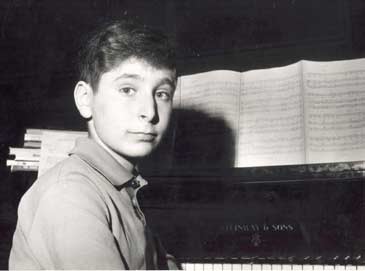
Igor Stravinsky - [photo L with score of The Owl and the PussyCat]:
1) - - Mr Stravinsky is delighted that your son will be singing The Owl and the PussyCat. In fact, he thinks that a boy's voice may offer the ideal timbre and style. He is not opposed to a faster tempo, even as fast as 168/quaver. Even the very bad CBS recording is faster than the 140 but not enough faster - - He would be most interested in having a tape
(signed Secretary)
2) - - I enjoyed it very much. Especially the impersonations, the pig is really superb. The tempo is quite right, and so is the balance between the voice and the piano
(Signed: Igor Stravinsky 5 April 1968)
Children's Songs by Russian
Composers
Mussorgsky 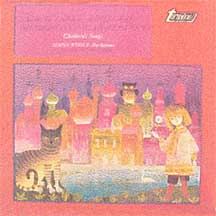
- The Nursery: With Nurse; In the Corner; The Beetle; Dolly's Lullaby; Evening Prayer; The cat and the birdcage; The hobby-horse
- A Child's Song; Ragamuffin
Prokofiev
- Three Children's Songs: Chatterbox; Lollipop; The Little Pigs
- The Ugly Duckling
Stravinsky The Owl and the Pussycat [Accompanied by Peter Grahame Woolf]
Kabelevsky - Seven Nursery Rhymes: Old King Cole; If all the seas were one sea;- I saw a ship a-sailing; There was an old woman; For want of a nail the horse-shoe was lost; Five little pigs; The Key of the Kingdom
Simon Woolf (boy soprano) Steuart Bedford (piano), Dr P Grahame Woolf (piano). Turnabout TV 34331S 1968 n.l.a.
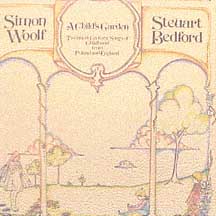 A Child's Garden
A Child's Garden
41 Twentieth Century Songs of Childhood From Poland and England
(Click on the blue links on this page to sample sound tracks)
and for texts and photos)
Contact for enquiries
KAROL SZYMANOWSKI Twenty Children's Rhymes sung in Polish (sample .mp3s)*
Przed Zasnieciem (Before falling asleep); Jak si, najlepiej op,dzac ad szerszenia How to best get away from a hornet; Mieszkanie-Home; Prosi - (Piglet); Gwiazdka - Little Star
Slub krolewny - (The Princess' wedding)
Trzmiel i iuk - The bumblebee and the beetle; Swieta Krystyna - Saint Krystyna; Wiosna - Spring; Kolysanka Lalek - The dolls' lullaby ; Gil i sroka - The bullfinch and the magpie; Smutek - The sad one; Wizyta u krowy - A visit at the cow's ; Kolysanka Krzysi - Tina's lullaby ; Kot - The cat; Kolysanka Lalki - Duckling ; Myszy - Mice; Zly Lejba - The cheating shopkeeper ; Kolysanka gniadego konia The bay-horse's lullaby; Nikczemny szpak - The ill-tempered starling
ENGLISH SONGS
The Ship of Rio (Britten)
Poor Henry (Berkeley)
The Fly (Bennett)
Clock-a Clay (Bennett)
I had a dove (Frankel)
The Wind at Morning (Salzedo)
Fishing:The Herd-Boy's Song (Oldham)
From a Child's Garden
(R.L Stevenson cycle of of 12 poems set by Sir Malcolm Williamson)
My Bed is a Boat (No 8)
Where the bee sucks (Tippett)
(Unicorn RHS 316, LP) 1969 n.l.a.
*Full texts and translations of the Illakowicza poems set by Szymanowski
CD-R tranfers: "Thanks so much for letting me hear this CD. I was astounded not just by the vocal and musical quality of this singing, but by Simon's acting ability which made the Musorgsky come alive in a mesmerising way. He seemed to be inhabiting the scenes - just the kind of 'realism' I think Musorgsky would have wanted!" Amanda Glauert (Head of Postgraduate Programmes and Research, Royal Academy of Music)
I found these performances really remarkable. The diction is unearthly in its clarity, the understanding of the text improbably knowing and profound in a child performer. The discs had a great emotional effect on me; the sense of poignancy, even loss, in hearing a child sing about childhood with such feeling was immense. I know of nothing like these performances at all.
I am currently performing Schumann's Kinderszenen; they are well-known to be an adult's nostalgic view of what childhood is. Simon Woolf's singing has the same balance and maturity, with the difference that he is a child, so that the experience of listening to him is almost unbearably moving. Jill Crossland
I've just listened to the 2nd CD - Amazing - I'd run out of superlatives if I tried to say any more - for me the Szymanowski is the highlight of the two CDs, showing the full range and timbre of Simon's voice and astonishing vocal gymnastics. I guess he must be bi-lingual ( or multi- )? - Polish is such an expressive musical language - you captured a rare brief talent for others to enjoy, which must give you immense satisfaction. Now I must try a little of Simon's jazz - Once again, many thanks. Chris Martin Yates
- - it's pretty amazing - - the music and texts are quite complex - - it's a great listen - - I think you would find it difficult to get this re-released on a label, because it is only really possible to promote CDs of artists who are performing worldwide. An artist who doesn't perform any more is very much a non-starter... Jan Hart
I am amazed at the voice characterization Simon managed – you can SEE the Nanny standing akimbo over the child, and the Kabalevski songs raised the hair on the back of my neck! How on earth did he manage to learn the Williamson songs? An adult would have had difficulty with them - - Richard Wingate
Many thanks for your absolutely interesting mail! In the sixties a very illustrious Polish musicologist and music critic showed me your son's recording of Szymanowski's Songs.
I was truly impressed. His singing was amazing, his pronunciation of pretty difficult my mother language, faultless. And what especially impressed me, that was poetic way of his interpretation.
I only wish all your son's recordings appear on CDs. If it happens, please, let me know. I certainly will be the first purchaser.
Happy New Year 2010 Jerzy Marchwinski (Professor at Fr.Chopin University of Music in Warsaw)
P.S. My wife Ewa Podles told me after hearing your son: "I would never thought it was a boy who sung. The voice sounded almost like true soprano of an adult singer performing childrens songs. Interpretation was really mature, much better even than of famous singers (Nomina sunt odiosa!). This boy seemed to have understood everything what he was singing about. His Polish pronunciation was exemplary".
Your texts were wonderful! A great improvement over the earlier efforts. And as for Simon's singing-- absolutely INCREDIBLE. I've gushed about it to countless people - - the musicality and musicianship were both jaw-droppingly good; and I kept going back to the Nanny and Mother voices, convinced that it had to be adult women singing those bits, but it was Simon, wasn't it? Really fantastic. I loved it, and would love to see the recordings back in print.
Maria Jette (singer, who gave The Nursery in our translation - California, 2009)
I am pleased to have
been introduced to Simon's extraordinary talent. Your son was really very good, he has a nice, clear, unaffected voice: pleasingly pure, accurate and in tune throughout the range (and no strained or insecure notes either). Next, his diction is excellent: you can hear every word. Third, he has enough self-confidence to really do the job, and to characterise the music. He doesn't just sing the notes; he really performs the piece. Moreover, he does it convincingly and maturely, rather than in a showing-off type of way. To be able to do that in combination with a good enough voice to pull it off convincingly is a rare thing in a young boy. (Geoffrey Terry, recording engineer)
For original reviews of the LPs, see below
Contact for enquiries
SZYMANOWSKI
TWENTY CHILDREN'S RHYMES OP. 49
Brief yet striking miniatures abound in this recital of songs of childhood. Illakowiczowna's verses inspired Szymanowski towards a new concentration and transparency of style, and the attractive, spontaneous Children's Rhymes will surprise and delight those who may find his larger works, with their rich textures and intense emotionalism, somewhat cloying. The poems are about the nursery, animal life and nature, themes similar to those of the English songs in this recital. Here it is as if an imaginative child is making up the poems, sharing the thoughts and fantasies with a doll, and projecting fears and secrets upon animal characters.
Szymanowski's sister, Stanislawa, wrote that interpreters "should forget their own ambitions as singers and the technical routine of correct voice production, even though there are certain vocal difficulties such as sustained pianissimos. One has to want to be in the nursery, to feel its presence, and become a child again". Perhaps, as in the case of Mussorgsky's The Nursery, one right solution is for the songs to be interpreted in a child's own voice, so as to recapture the freshness and immediacy of Szymanowski's original vision.
Generous Polish friends helped Simon to perfect his performance until Dr. T. Krzeszowski of Edinburgh University Linguistics Department was able to testify that "the enunciation is such that the words can be followed and understood without any effort on the part of the Polish-speaking listener. The recording is free not only of mistakes in pronunciation but even of minor slips".
Szymanowski's biographer, B. M. Maciejewski, considers these songs by Poland's greatest composer of the early 20th Century to be "in the very best Mussorgsky tradition". He welcomed this first recording of the Children's Rhymes writing, "Simon Woolf understands the romantic simplicity of Szymanowski's vocal writing and he brings out the composer's subtle sense of humour. His interpretation is very convincing, indeed inspired. The singing in the original Polish has no trace of any foreign inflection - a truly remarkable achievement".
ENGLISH SONGS
In his early years Simon's staple musical diet comprised piano pieces from Bartok's Mikrokosmos and songs by Britten, the later sets purchased immediately each was published. Children can respond eagerly to vocal music by many of those contemporary composers whose instrumental works rarely cater for young musicians and small hands. So the English songs chosen for this recital "illustrate how one boy got to know important living composers of his own country". Maybe listeners to these performances will share the excitement of exploration and discovery.
Simon was privileged to meet most of the composers, whose songs deal with different aspects of childhood. The life of the nursery is evoked by Britten and Berkeley in settings of Walter de la Mare, and by Williamson in his recent cycle to favourite Robert Louis Stevenson verses. Nature and the countryside are the subjects of the group by Salzedo and Oldham. Animal life, interpreted by various poets, links the songs by Britten, Bennett, Frankel and Tippett.
Benjamin Britten's early school-song, The Ship of Rio, needs no comment save to reveal that an extra pianist was needed to complete our recording of the composer's revised version. One very high note on the Steinway obstinately refused to sound, so Grayston Burgess supplied it on the Bishopsgate Hall's other piano. Thus Britten's part-song, originally for two voices and piano, re-appears as a solo with accompaniment for two pianos! The poet of childhood, Walter de la Mare, is one link between our first two English songs; another is the close association between their composers, who even collaborated once on a joint composition, MontJuic. Simon's account of Poor Henry gave Lennox Berkeley great pleasure. "It's surely very suitable that a boy should sing it", he wrote, "and I was much struck by his undoubted interpretative gift." Simon's operatic experience stood him in good stead for this harrowing tale of a boy swallowing horrid medicine.
Richard Rodney Bennett's The Insect World for unison voices, dedicated to Malcolm and Dolly Williamson, brings us back to the world of the school choir (Clock-a-clay is an old name for the ladybird). Benjamin Frankel's strangely haunting I had a dove has long been a favourite of ours, and his Eight Songs all deserve to be better known. Simon was privileged to sing them to the composer's own piano accompaniment. Perhaps a boy's voice can help to realise the childlike simplicity and directness of Keats' poem and Frankel's direction "con un innocenza grottesca".
Leonard Salzedo composed The Wind at Morning after hearing Simon sing Stravinsky's last published composition, his 12-note setting of The Owl and the Pussy Cat. Salzedo's friend John Cromer supplied a nature poem and the song was deliberately made "not very easy to sing"! Arthur Oldham's Chinese Lyrics also evoke nature anathe countryside. They have been in Simon's repertoire since he was 8, when he corresponded with the composer about a technical point of interpretation.
Malcolm Williamson has high regard for R. L. Stevenson's popular and deceptively simple children's poems. He stresses their dark undertones and has composed songs, some tuneful and romantic, others terse epigrams which rival Web ern in achieving complete and memorable statements within a quarter of a minute! The composer himself made a domestic recording of From a Child's Garden with Simon very soon after it was published, and he praised his singing as "entirely characteristic for what these Stevenson words require".
Sir Michael Tippett's tiny song is an ideal encore, unique in its precision and economy for a time when the composer still favoured a luxuriant proliferation of counterpoint. The alternative harpsichord version of Songs of Arid was performed first by Grayston Burgess, Simon's singing teacher. The composer was happy that Simon should sing them, a boy's timbre being obviously apt for Shakespeare's sprite.
© P. Grahame Woolf
Simon Woolf was born in August 1954 into a musical family. He sang from early childhood I and learnt to play recorders, piano and cello. Only after a Royal Festival Hall appearance with Joan Sutherland and a successful BBC audition the following day did he take singing lessons, with Grayston Burgess, the director of the Purcell Consort of Voices. These studies enabled Simon to develop an unique repertoire of songs about childhood, never previously sung by children. Throughout two packed years until his voice broke he was in constant demand for the concert platform and operatic stage, radio and television, whilst continuing his general education at St. Dunstan's College, London.
Simon Woolf's recordings include medieval motets, Purcell and Handel, Mendelssohn's Elijah and recent songs by living composers. No other boy singer has ever recorded music of such variety. "Records and Recording"
has written of Simon Woolf; "This is a boy artist of exceptional maturity".
Steuart Bedford was at the time of recording a member of the music staff of The English Opera Group and a professor at the Royal Academy of Music. Well known as a conductor, organ recitalist and pianist, he was Simon Woolf's partner for his first recital record of songs by Russian composers.
Recorded at Bishopsgate Hall, London in February and March 1969
Musical Director: Grayston Burgess; Engineer: ]. W. Bower
Polish Language: J. Kot and R. Pachocinski
Programme devised and produced by P. Grahame Woolf
Sleeve design and Illustration: Hamish Grimes
Translations: S. A. Witkowski and J. Abramczuk *
Session photographs: Peter W. Goff
REVIEWS of the Turnabout LP of Children's Songs by Russian Composers:
THIS IS VERY MUCH a family affair, for not only does the 13-year-old boy soprano Simon Woolf sing this recital, but Dr P Grahame Woolf, his father, appears as pianist (in the Stravinsky) and either translator or reviser of the translation in all cases (except the Stravinsky, a seldom heard setting of Edward Lear in serial technique, would you believe); Dr Woolf also contributes the sleeve-notes.
This collection of Russian children's songs makes a most attractive programme, covering quite a wide range of compositional styles, and Simon Woolf's performances have extraordinary interpretative maturity. In the fine Mussorgsky song-cycle The Nursery (surely the most remarkable example of a composer's insight into the feelings of childhood) he brings the various characters (adult as well as childish) vividly to life, and sings throughout the disc with exceptional feeling for atmosphere and the meaning of the words, as well as real musical sensitivity. Steuart Bedford's accompaniments are superbly pointed and coloured, and the delightfully tongue-in-cheek Stravinsky is beautifully done by Dr Woolf - - altogether a most auspicious record.
JOHN MCCABE (Records & Recording July 1971)
Only a generation ago it would have been almost unheard of for a 13 year-old to attempt music as difficult as Mussorgsky's Nursery and Stravinsky's late, serial setting of The Owl and the Pussy Cat, but the growing generatIon of children seems at home in music that one would think presented all manner of stylistic and still more technical problems.
Simon Woolf is a good example: he is a very musical boy, untroubled alike by Stravinsky's intervals and Mussorgsky's sudden, abrupt, irregular phrases, and gifted with a nice, slightly astringent tone quality. He can vary this more than most trebles, and there is not only only some amusing near-mimicry in The Owl and the Pussy Cat but a real feeling for characterisation in The Nursery and The Ugly Duckling. He has a vivid sense of words, and shows an understanding for the very tricky music on this record that is truly remarkable. - - He sustains the narrative in The Ugly Duckling as if it presented no problem at all. This is imdeed the charm of the record - the sense of an extremely musical boy completely at home in music one would have thought outside a child's range, blithely passing through problems that can enmesh the most expert grown-ups. (J.W. The Gramophone, July 1971)
The first strong point in this record's favour is that of its interesting and entertaining repertoire. The second, to my mind, is that it goes part of the way toward solving the ancient problem of how music for children, assuming it to be written in a convincing idiom - which is seven-eighths of the battle, should be interpreted. As adult performers are conspicuously inept and mainly incapable of re-adjusting themselves to childhood, the answer would seem to be to get a child to do it. But the problem is that there are few children capable of performing such composers as Mussorgsky, Prokofiev and Stravinsky in a way that will please grown-ups; for, such is the topsy-turvy world of 'art' song that music 'for children' is rarely childlike or childish. In most ways the solution is with us for Simon Woolf (aged 13 when this record was made) has a remarkable mature interpretative capacity, yet has a delightfully fresh young voice and should prove able to bridge the generation gap and make the songs pleasurable to young and old alike.
For the first time, I have really enjoyed The Nursery. Previously it has seemed arch and contrived. Now here is a real and fairly nasty little boy, rather spoilt and snappy, actually singing the pieces in character - and with great skill into the bargain. Amazing, too, how modern the music sounds: is it the association with the boy's voice, but it sounds very Brittenish at times.
The Kabalevsky Nursery rhymes are uncomplicated and easily enjoyable and do not stray far from the traditional versions that we know. Again Simon Woolf's voice is ideally cast. Likewise in the three Prokofiev Children's songs and in Stravinsky's light, gay and clever, serial setting of The Owl and the Pussycat; Stravinsky himself had high praise for the singer's performance having written it with a boy's voice as the ideal in mind. The Ugly Duckling, in the original piano version of 1914, is beautifully handled. A special word of praise for Steuart Bedford's accompaniments which are extremely lively and entertaining in themselves. He manages to steer the proceedings without in the least seeming to, and the piano is well balanced and recorded. The only slight criticism is that the words are sometimes not quite clear; otherwise it is all very entertaining and accomplished [A: 1]. Peter Gammond (Hi-Fi News & Record Review, July 1971)
The Boy Choir & Soloist Directory
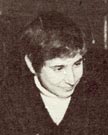
Simon Woolf
From a local debut in "Acis and Galatea" near his Blackheath home, twelve-year-old Simon Woolf was catapulted into London's musical life at the highest professional level. His second concert found him singing solos in Messiah at the Royal Festival Hall alongside Joan Sutherland.
After that it was decided he ought to have expert singing lessons and, through the the Royal School of Church Music he was directed to Grayston Burgess (counter-tenor) who prepared him for a brief and hectic career.
Simon was in continual demand for the concert platform, operatic stage, radio and television until his voice broke.
His operatic roles included Amah! at Southwark Cathedral, Harry in Albert Herring at GSMd, and two seasons in The Magic Flute at the Royal Opera House, Covent Garden.
His gramophone recordings include duets with Fischer-Dieskau (Elijah) and John Shirley-Quirk (Hail Bright Cecilia).
After a star-studded childhood career as a treble, Simon Woolf went to an opposite pole of the musical world, becoming a jazz assist.
He has performed regularly with many top London players, notably as part of Andy Panayi's Mulligan-infIuenced quartet, as well as backing visiting Americans. He has a distinguished freelance career which includes stints with Bobby Wellins, Bill le Sage, Dave Cliff, John Critchinson, cornettist Ruby Braff and singer Weslia Whitfield.
As well as working with Andy Panayi's Quartet, he has also been a regular member of bands led by pianist Peter Jacobsen and Geoff Simkins. Recordings include a trio with Harry Allen and Howard Alden and an appearance on a Steve Melling release. He also composes, plays piano and sousaphone, has taught jazz bass at both Trinity and Royal Colleges of Music and contributed to 'Doublebassist' magazine.
Listen to don't ask
- Geoff Simkins Quartet
(Symbol Records)
|
|
2010
A lyrical double-bassist in the tradition of the incomparable Red Mitchell, Simon Woolf attributes his love of melody to hours spent as a child, father at the piano, singing through the works of Franz Schubert.
A late starter on bass, Simon Woolf took up both electric and acoustic instruments during the final year of a music degree course at York University, exploring free improvisation and soul music as well as arranging and playing for a more conventional jazz quintet.
Re-locating in London, Simon Woolf developed his jazz playing under the tutelage of Tristano disciple Peter Ind, while pursuing a varied career as a freelance bassist, primarily in West End theatre. A re-kindling of interest in classical music led to a year’s intensive study of orchestral double-bass at the (now defunct) National Centre for Orchestral Studies followed by a return to musical theatre for a year long tenure in the National Theatre production of ‘High Society’ (cast included Natasha Richardson, Stephen Rae, Trevor Eve).
Attempts to relieve the monotony of eight shows a week provided the launchpad for Simon’s long association with Andy Panayi, when drummer (and High Society colleague) Paul Clarvis started the quartet ‘Tailpiece’, completed by Panayi and Phil Lee.
Following a trip to New York, Simon Woolf befriended the great bassist Michael Moore, then on sabbatical in England playing piano and composing. The ensuing period of study and collaboration led to associations with such legendary jazz figures as Ruby Braff and George van Eps and an extended engagement in San Francisco with singer Weslia Whitfield.
More recently, Simon has developed a teaching career, inspiring young bass players across London at all ages – he continues to perform in the Andy Panayi Quartet, touring the new CD The Solar Cats and has appeared at Ronnie Scott’s with Benny Golson
Now firmly established as one of the country’s leading Jazz bass players, his band reflects his interest in melodic, straight-ahead jazz – expect a blend of originals and Simon’s arrangements of Jazz standards, delivered by a truly classy ensemble that also features Karen Sharp on tenor and Mat Fishwick on drums.
Simon Woolf’s All-Star Quintet (2010)
Karen Sharp - tenor sax Mattias Eskilsson - trombone John Horler - piano Matt Fishwick - drums
Simon Woolf - bass
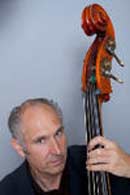
And enjoy Simon Woolf Sextet 2010 on YouTube :
I get a kick out of you
The Dolphin
Playing jazz piano, and bass with Dave Cliff
at Pizza Express 1994 & 2002
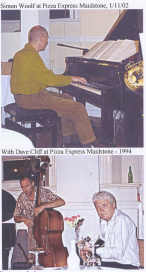
|
Other Recordings:
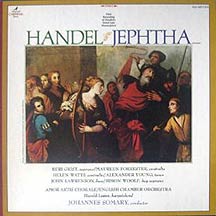
Handel: Jephtha (Vanguard Cardinal Stereo VCS 10077/8/9, 3 LPs)
Reri Grist / Mareen Forrester / Helen Watts /
Alexander Young / Simon Woolf
with the English Chamber Orch.
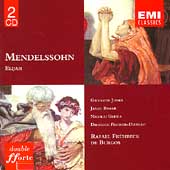
Mendelssohn: Elijah
(EMI CDFB 68601, 2CD)
with Fischer-Dieskau, Nicolai Gedda, Janet Baker,
Simon Woolf, Wandsworth School Boys' Chorus,
Philharmonia Chorus & Orchestra cond. Rafael Frubeck de Burgos
|
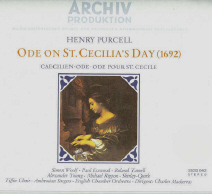
Purcell: Ode on St. Cecilia's Day (1692)
Hail Bright Cecilia
(Archiv Galleria 427 159) 1969
with Alexander Young, John Shirley-Quirk, Simon Woolf,
Tiffin School Boys Chorus, Ambrosian Singers, English Chamber Orchestra
conducted by Charles MacKerras
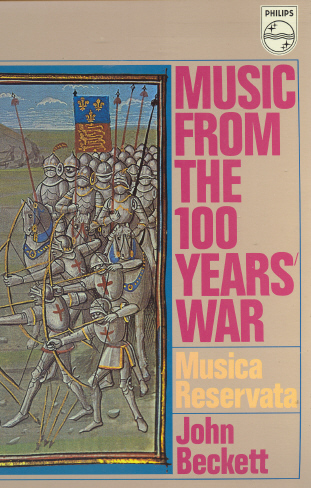
Cooke etc with Nigel Rogers & Musica Reservata
Philips SAL 3722
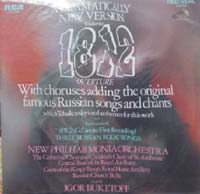
Children's Choir for 1812
Igor Buketov RCA
|

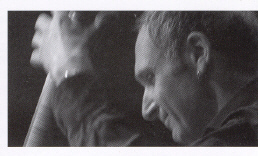
SIMON WOOLF'S "WOOLF NOTES"
- - One of the country's leading Jazz bass players, his melodic invention and remarkable technique mark him out as one of the most musical and tasteful players on the scene. His band reflects his own interest in melodic, straight-ahead, Jazz, the repertoire consisting of Simon's originals plus a variety of classic Jazz standards, all arranged by Simon, and performed by some of the finest players around.
Steve Rubie, owner 606club
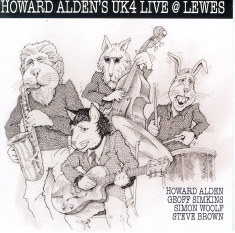 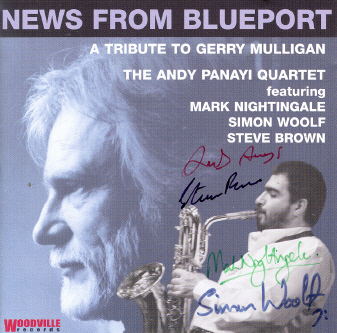
|
|



